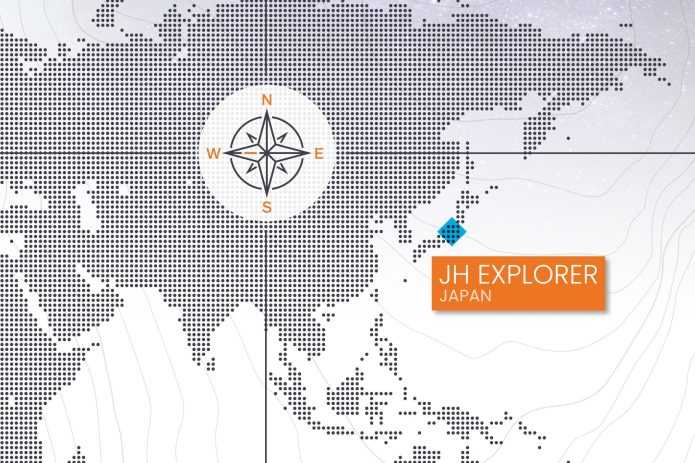
| The JH Explorer series follows our investment teams across the globe and shares their on-the-ground research at a country and company level. |
Japan is renowned for its rich history, idyllic landscape and one-of-a-kind inventions. It is also home to the oldest known business in the world, Kongō Gumi, a construction firm specializing in temples and shrines, founded in 578 AD. With this wealth of business experience in mind, I took a trip to Japan to learn more about the companies that operate there as well as its economic and political climate. These were my key findings:
1. Sustainability is becoming ubiquitous
The idea of sustainability is not new to Japan; the ancient concept of “Mottainai” – to respect and not waste resources – has sustainability embedded into Japanese culture. According to the UN’s Sustainable Development Report Japan ranks 19th out of 193 Member States in terms of its progress towards achieving the Sustainable Development Goals, putting it among the top countries in Asia with regards to sustainability. Indeed, Japan has become a leader in championing sustainability efforts in Asia with many of its policies and initiatives in line with the 2030 Agenda for Sustainable Development.
It should perhaps have been no surprise then to be greeted by a billboard promoting sustainable innovation at Tokyo’s Haneda Airport and to come across an advert for Climate Group’s EP100 initiative on a TV in the back of a taxi. In my short time there it became clear that sustainability is a key focus for Japanese policy.

2. Japanese companies are finding it increasingly more difficult to find workers
Japan has the highest proportion of elderly citizens of any country in the world, which puts a great deal of pressure on its labor force. This reality has been exacerbated by the measures imposed at the onset of the COVID pandemic, which saw a decrease in foreign workers and a smaller portion of the labor force return to work after restrictions were lifted. Difficulty finding workers was a relatively common theme in the company meetings that I attended, with many management teams expressing that this could limit their ability to grow over the medium and long term.
Digitalization can offer a solution to labor shortages in many cases by filling critical but often mundane roles. Doing so enables companies to realise efficiencies and creates space for more meaningful roles that are more appealing to workers. But while this may be a good solution, the Japanese economy is currently behind the curve when it comes to digitalization relative to the rest of the Western world.
The good news for investors is that companies which offer automation and business solution services are well placed to benefit from this theme as the need for digitalization increases. These businesses could include tools which support business operations such as TechnoPro, a technology-focused staffing and services company, or cloud computing tools such as those provided by Rakus, a cloud services provider for small and medium-sized enterprises (SMEs). Digitalization also allows for companies to utilize data-driven insights to better understand customers, identify inefficiencies and improve existing functions, which should ultimately provide benefits for all stakeholders.

3. Japanese companies are moving operations away from China
It became apparent upon meeting many Japanese companies that they are becoming more aggressive in their intentions to decouple from China. This was evident in the fact that some of the companies that I met with are choosing to build more manufacturing capacity outside of China and ensuring that critical technology is nowhere near Chinese shores. While the extent of any threat that China poses to Japan is up for debate, these actions clearly signal plans to take back control of strategically important industries and operations.
It should be noted that Japan is not alone in these efforts. Companies across Europe and North America have begun reshoring operations and supply chains as the weaknesses associated with globalization have become a reality over the past two years. Interestingly, we have seen many developed world policymakers put sustainability at the core of policies intended to rebuild a sustainable and digital economy. In a policy speech by Japanese Prime Minister Fumio Kishida, the intended post-COVID growth strategy “will work to resolve social issues, including digitalization, climate change, economic security and science, technology and innovation”.
As the sun sets over an era of globalization, we expect that the new environment – in which economic security goes hand in hand with digitalization and sustainability – will offer plenty of opportunities for investors globally.

UN Sustainable Development Goals (SDGs) are a collection of 17 global goals adopted by the UN which intend to create global positive change by 2030. Among other things, the SDGs are an agenda to end poverty, promote equality, create prosperity and protect the planet.
EP100 is a global initiative led by the international non-profit Climate Group, bringing together over 120 energy smart businesses committed to measuring and reporting on energy efficiency improvements.
References made to individual securities do not constitute a recommendation to buy, sell or hold any security, investment strategy or market sector, and should not be assumed to be profitable. Janus Henderson Investors, its affiliated advisor, or its employees, may have a position in the securities mentioned.
Environmental, Social and Governance (ESG) or sustainable investing considers factors beyond traditional financial analysis. This may limit available investments and cause performance and exposures to differ from, and potentially be more concentrated in certain areas than, the broader market.
These are the views of the author at the time of publication and may differ from the views of other individuals/teams at Janus Henderson Investors. References made to individual securities do not constitute a recommendation to buy, sell or hold any security, investment strategy or market sector, and should not be assumed to be profitable. Janus Henderson Investors, its affiliated advisor, or its employees, may have a position in the securities mentioned.
Past performance does not predict future returns. The value of an investment and the income from it can fall as well as rise and you may not get back the amount originally invested.
The information in this article does not qualify as an investment recommendation.
There is no guarantee that past trends will continue, or forecasts will be realised.
Marketing Communication.
Important information
Please read the following important information regarding funds related to this article.
- Shares/Units can lose value rapidly, and typically involve higher risks than bonds or money market instruments. The value of your investment may fall as a result.
- Shares of small and mid-size companies can be more volatile than shares of larger companies, and at times it may be difficult to value or to sell shares at desired times and prices, increasing the risk of losses.
- The Fund follows a sustainable investment approach, which may cause it to be overweight and/or underweight in certain sectors and thus perform differently than funds that have a similar objective but which do not integrate sustainable investment criteria when selecting securities.
- The Fund may use derivatives with the aim of reducing risk or managing the portfolio more efficiently. However this introduces other risks, in particular, that a derivative counterparty may not meet its contractual obligations.
- If the Fund holds assets in currencies other than the base currency of the Fund, or you invest in a share/unit class of a different currency to the Fund (unless hedged, i.e. mitigated by taking an offsetting position in a related security), the value of your investment may be impacted by changes in exchange rates.
- When the Fund, or a share/unit class, seeks to mitigate exchange rate movements of a currency relative to the base currency (hedge), the hedging strategy itself may positively or negatively impact the value of the Fund due to differences in short-term interest rates between the currencies.
- Securities within the Fund could become hard to value or to sell at a desired time and price, especially in extreme market conditions when asset prices may be falling, increasing the risk of investment losses.
- The Fund could lose money if a counterparty with which the Fund trades becomes unwilling or unable to meet its obligations, or as a result of failure or delay in operational processes or the failure of a third party provider.
- The Fund follows a growth investment style that creates a bias towards certain types of companies. This may result in the Fund significantly underperforming or outperforming the wider market.
Specific risks
- Shares/Units can lose value rapidly, and typically involve higher risks than bonds or money market instruments. The value of your investment may fall as a result.
- Shares of small and mid-size companies can be more volatile than shares of larger companies, and at times it may be difficult to value or to sell shares at desired times and prices, increasing the risk of losses.
- The Fund follows a sustainable investment approach, which may cause it to be overweight and/or underweight in certain sectors and thus perform differently than funds that have a similar objective but which do not integrate sustainable investment criteria when selecting securities.
- The Fund may use derivatives with the aim of reducing risk or managing the portfolio more efficiently. However this introduces other risks, in particular, that a derivative counterparty may not meet its contractual obligations.
- If the Fund holds assets in currencies other than the base currency of the Fund, or you invest in a share/unit class of a different currency to the Fund (unless hedged, i.e. mitigated by taking an offsetting position in a related security), the value of your investment may be impacted by changes in exchange rates.
- When the Fund, or a share/unit class, seeks to mitigate exchange rate movements of a currency relative to the base currency (hedge), the hedging strategy itself may positively or negatively impact the value of the Fund due to differences in short-term interest rates between the currencies.
- Securities within the Fund could become hard to value or to sell at a desired time and price, especially in extreme market conditions when asset prices may be falling, increasing the risk of investment losses.
- The Fund could lose money if a counterparty with which the Fund trades becomes unwilling or unable to meet its obligations, or as a result of failure or delay in operational processes or the failure of a third party provider.
- The Fund follows a growth investment style that creates a bias towards certain types of companies. This may result in the Fund significantly underperforming or outperforming the wider market.